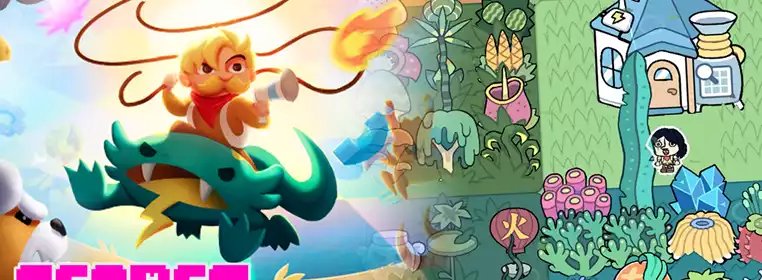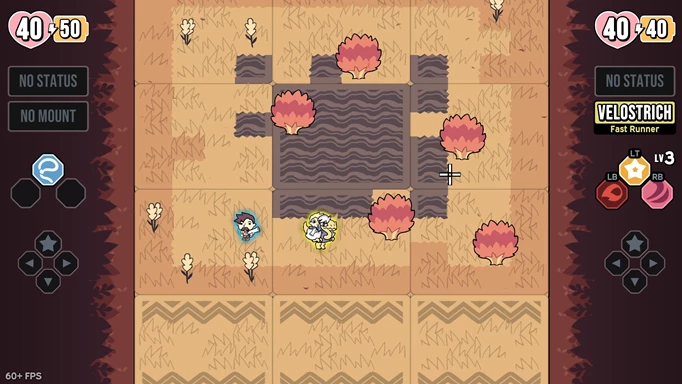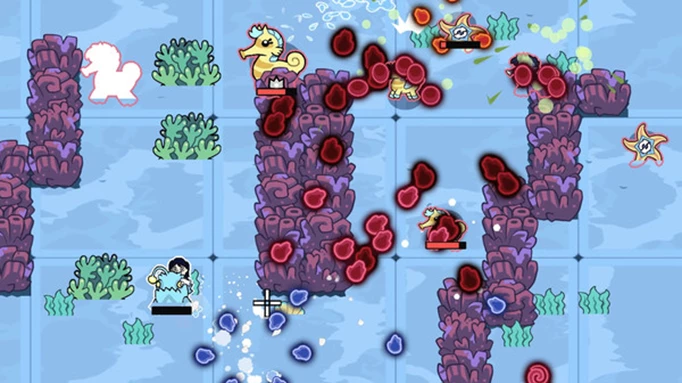Secret Shelf - Patch Quest is the cutest monster-snatching Metroidvania you ever did see

We're no strangers to the Metroidvania at this point, with the genre sweeping Steam's indie section. It's a perfect marriage between development ideals - typically low-poly graphics that make them ideal for small development teams, a side-on perspective that allows for easier (but still ambitious) level design, and a replayability that makes even the shortest of games valuable. You'd think that its presence in the industry would make for the genre growing tiresome, but we've seen the contrary - the likes of Hollow Knight, Enter the Gungeon and Ori have all seemed to twist and contort the genre to suit their atmosphere, with gothic and faery-esque ambience without letting up on its signature difficulty or intricate design.
But, surprisingly, there are still untouched areas of game design that haven't yet been addressed by the Metroidvania. And Patch Quest looks to dig up a few of these mysteries itself.
Deadliest Patch
Many Metroidvanias differentiate themselves with slices of other subgenres, and Patch Quest is no different. Smashing together a papercraft aesthetic with Bullet Hell dramatics and even a Pokemon Ranger-esque means of making furry friends, there's a lot pumping into the roguelite, and the game's solo developer Liam isn't shy about that.
When speaking to GGRecon, we asked Liam about the inspirations that came together to create Patch Quest, and he was incredibly forthcoming when it comes to the breadth of the catalysts that brought the game to life. "Hollow Knight, Mario Odyssey, Hohokum and even the single-player mode of Super Smash Bros Ultimate! The game had a very long development cycle, so I was able to slowly draw in new elements and knit them into the existing design."
This design could easily have become muddled with all of these sources, especially when combining so many genres as well as an entirely fresh monster capture, but thankfully the development of Patch Quest was incredibly aware of this.
"the biggest tension was between the Metroidvania elements and the Roguelike elements," Liam adds. "Metroidvania games have fixed, intricately designed mazes – whereas Roguelikes have chaotic, randomised challenges. Merging the two was a challenge! My solution was to make the 'big picture' a fixed maze, but then randomise all the little details. So even when you’re heading down the same path as last time, you won’t see the same monsters or collect the same powerups."
Patching a predator

 Click to enlarge
Click to enlargeThe Metroidvania is a fantastic jumping-off point when it comes to influencing a game's creation, that much is hard to deny - but there are admittedly some drawbacks. There are inherent limits to the style's unfurling, with backtracking and rehashing being a source of tedium in games that don't absolutely nail the soaring highs that the genre can offer. So, with this in mind, Liam doesn't mess around.
"Most Metroidvania games place lots of hard limits on your exploration. For example, you won’t be able to pass through a room until you unlock the double jump. But in Patch Quest, the limits are based more on the difficulty of each area. If you can mount the right monsters, they’ll have passive abilities that neutralise some of the hazards in each zone. For example, Roladillo can climb steep cliffs. Poislug can’t be snared by jungle vines. And Skiial can move across ice without slipping. This means discovering all the monsters and their abilities is the main way you can neutralise the difficulty of particular zones."
Shifting difficulties based on player ingenuity is a refreshing twist on a game that throws a brutal sum of projectile at you in the most intense boss battles is a fascinating addition to a game that could have simply been a more uniform experience, and it's The Binding of Isaac levels of foresight that the game asks of its players if it wants to survive the game's onslaughts. It certainly sounds intense, but Patch Quest's aesthetic makes leaps and bounds to disarm this.
"Bright and simple has always been an intentional decision," Liam says, "to avoid distracting from the gameplay as much as possible. But achieving that goal has been a long journey of reworking and stripping out detail wherever I can."
Patch Quest could be the next big thing

 Click to enlarge
Click to enlargePatch Quest is a smattering of ideas and concepts that come together in a wholesome package in spite of the difficulties that lie in wait, which is an impressive balance to strike as a one-man team. The game has been in the works for seven years, and the sheer sum of ideas and executions you'll see unfold throughout the game really indicate that not a moment of this time was wasted.
It's impressive to know that only one person was behind a game like Patch Quest in the first place, but to then strike such a fine balance between concepts is something that makes the finest indie developers - we only need to look so far as ConcernedApe and Adamgryu to see this. Patch Quest is a humble game, but who knows - it could make its developer a star.
